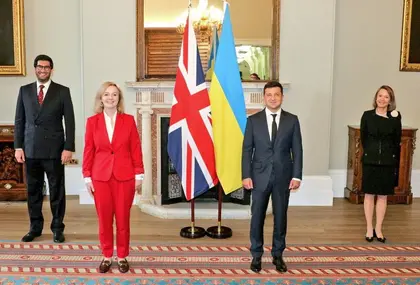Baroness Catherine Meyer freely admits that her October 2020 appointment to the role of the United Kingdom’s first-ever trade envoy to Ukraine was unexpected.
“For me, it was quite a surprise to be appointed and a great honor,” Meyer told the Kyiv Post in a telephone interview.
JOIN US ON TELEGRAM
Follow our coverage of the war on the @Kyivpost_official.
Boris Johnson appointed her the day before the UK prime minister met with President Volodymyr Zelensky in London on Oct. 7–8, 2020, when they signed trade and defense agreements.
Now Meyer, who last travelled to Ukraine 53 years ago, is learning as much as she can about the country.
Her main mission: “My role is to advance British-Ukrainian trade, to open doors for British exporters, and to create a relationship with Ukrainians who might be interested in doing business with the UK.” Meyer’s remit does not extend to assisting Ukrainian businesses looking to invest in the UK, although she says that she would be happy to help. “Helping people is useful because they help you back.”
This is an unpaid role. Most of her time will still be spent performing her duties as a member of the House of Lords, the upper chamber of the British parliament. She was appointed to the Lords by then-Prime Minister Theresa May in 2018, primarily for her work trying to stop child abductions. Her interest in the issue arose after her ex-husband failed to return their two sons from a holiday they spent with him in Germany, leading Meyer to set up a nongovernmental organization in 1999 that is now known as Action Against Abduction.
Meyer has also worked as a commodity broker in London and is now married to Sir Christopher Meyer, the former British ambassador to Germany and the United States. In her new role as trade envoy, Meyer met with Zelensky and his traveling team during their October 2020 UK visit. However, her ability to fulfill the largely diplomatic role has been severely hampered by the COVID‑19 pandemic.
“I’m dying to come to Ukraine in order to get a feel for the country and meet the right people,” Meyer said.
Her last visit to Ukraine was in 1968, a few days before the Soviet Army invaded Czechoslovakia. She was 15 and was accompanying her Russian-born mother, who was visiting friends and family in Kyiv and Moscow, having fled Russia after the 1917 Bolshevik Revolution.
Meyer was born in Saigon, which is where her mother and her French father met. Russian was her first language. Through maternal lineage, Meyer can claim part-Ukrainian ancestry: “I have some Ukrainian blood, believe it or not! From my grandfather’s side of the family.”
She has already helped two British businesses explore options in Ukraine. “You will have smoked salmon from a well-known English house called Forman and Field. In fact, the chap who owns it, Lance Forman, is of Ukrainian origin,” she said.
In addition to being the fourth-generation proprietor of his family business, Forman was briefly (until the UK’s formal withdrawal from the European Union on Jan. 31, 2020) a member of the European Parliament for the Brexit Party, which ran in British and European parliamentary elections in 2019 in favor of a “hard” Brexit — as clean a break from the EU as possible.
“I think his great-grandfather started the business in Odesa… I know him, so I asked ‘what about exporting your delicious smoked salmon to Ukraine?’ and he said yes. There’s also another exporter who’s hopefully going to come to Ukraine. They’re called Balfour Wines. I’ve just introduced them to the commercial attaché at the (British) embassy (in Kyiv).”
Meyer, like Forman, was a supporter of leaving the EU: “I went to Brussels many times for my work dealing with missing and abducted children. When you see the inefficiency… that made me a Brexiteer.”
She believes that Britain’s EU withdrawal will deliver benefits not only to the UK but also to Ukraine: “Trade is going to be much easier, because the rules and regulations that the EU imposes, particularly on food, are quite restrictive. I think it affected the export of chicken. Ukraine can see the UK as a good opportunity to export their goods, especially their grain, because we’re presumably going to import less from the EU, so you’re a new market to us and we’re a new market to you.”
Meyer named agriculture, defense, infrastructure, energy, IT, and pharmaceuticals as sectors promising sectors for post-Brexit bilateral trade.
She also highlighted existing projects as examples of what could happen more often in the future: “British companies are designing new metro stations in the city of Dnipro, landscaping in Lviv and advising on safer road design in Odesa. There is much that British advanced manufacturing can do to form partnerships with Ukraine to modernize and develop its own industry, in the aerospace and defense sectors in particular.”
When pitching Ukraine as a destination for British investment, Meyer often hears two themes in reply, which have long been a bane to investment in the country: “One of the problems I’m finding is convincing British exporters who still have a vision of Ukraine as under threat from Russia, and also the corruption problem.”
However, she is upbeat.
“People have a vision of Ukraine as a corrupt country, and that’s one of the things I’m trying to educate people on so that they understand the country a little bit better and understand that President Zelensky is working really hard. He has done some amazing reforms, and after only 30 years (of independence), what can you expect?”
You can also highlight the text and press Ctrl + Enter




